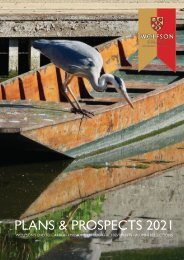Romulus 2018
Wolfson's Literary magazine Romulus
Wolfson's Literary magazine Romulus
- No tags were found...
You also want an ePaper? Increase the reach of your titles
YUMPU automatically turns print PDFs into web optimized ePapers that Google loves.
where our sense of how far back history goes is<br />
different. It always used to be said that Britain<br />
knew very little of the history of the Republic<br />
of Ireland, and that the Republic of Ireland<br />
knew rather too much. That produced some of<br />
the differences. And yet in my career, during<br />
the last 35 years, the relationship between<br />
the Republic of Ireland and the UK has been<br />
utterly transformed. So I tend to be optimistic<br />
about the direction. Yet it’s really important as a<br />
country like the UK never to brush history and<br />
the colonial era under the carpet, because it does<br />
still have a major impact upon the way relations<br />
are seen. If you think about our relationship<br />
with Kenya, you cannot separate that from the<br />
historical experience.<br />
You mentioned Nigeria and Ghana, and that<br />
what happened is irrelevant to our current<br />
relationship with these countries, but there are<br />
also other countries that feel more resentment.<br />
I would say that there’s much more complexity<br />
in those relationships. For example, if one looks<br />
at Zimbabwe, there’s still an awful lot of history<br />
that affects that relationship. I think that clearly<br />
Argentina is a country where we moved into<br />
a significant new relationship, but you can’t<br />
pretend that we haven’t had complex relations<br />
quite recently. Ironically, if you go even further<br />
back, Argentina is probably the country in Latin<br />
America that Britain is closest to and most like,<br />
in some ways, but that more modern experience<br />
is there. For the last year and a half I have been<br />
working on a lot of Caribbean countries, and<br />
relations with Western Union countries are still<br />
very much linked to the colonial experiences. I<br />
would also say that for a lot of these countries,<br />
particularly in the Caribbean, it was Britain’s<br />
decision to join the European Union that caused<br />
one of the biggest ruptures in our relationship,<br />
rather than things that happened even further<br />
back. History can be 1973-history.<br />
It was said that one of the positive things of<br />
Brexit was that there is going to be a stronger<br />
connection with countries of the Common Wealth<br />
and the Caribbean.<br />
It was certainly one of the lines given by<br />
the Brexiteers that this would open up new<br />
opportunities, and it definitely does; but if<br />
you look at Britain’s trade with the rest of the<br />
European Union, it’s about 40-50% of our<br />
trade, whilst Britain’s trade with the whole of<br />
the Common Wealth is about 8-10%, so they<br />
are very different kind of relationships.<br />
There is a border conflict that stems directly<br />
from the colonial past. Recently it has flared up<br />
again. I’m talking about the tension between<br />
Israel and Palestine. Do you think that Britain’s<br />
involvement has been sufficient (historically and<br />
present) in addressing the conflict?<br />
There are many people who would say that<br />
Britain’s involvement was too large in certain<br />
areas! All I can say is that I think our position<br />
at the moment, the British position -on the case<br />
of the two-state solution, and that there should<br />
be no resolution of the status of Jerusalem until<br />
the broader issues are settled- that seems to be<br />
absolutely the right kind of position, because it<br />
reflects the broad consensus in the region across<br />
the key parties. The former British foreign<br />
secretary, Peter Carrington, once said to me<br />
that there are a number of issues in the world<br />
that aren’t going to be resolved this year or next<br />
year; they feel utterly intractable, but a time will<br />
come when the stars will align, and they’ll be<br />
open to change. And you need to be ready and<br />
prepared for that moment. It has always felt to<br />
me like the Middle East peace process between<br />
Israel-Palestine is one of those that none of us<br />
can see a way through, this year or this decade.<br />
But there will come a time, and we need to keep<br />
on being ready for that time. I don’t know when<br />
that time will come, but it will be absolutely<br />
critical that we take hold of it when it comes.<br />
What does being prepared mean?<br />
Being prepared means investing in knowledge<br />
so that you keep on being in touch with the key<br />
players. We should stay close to the Palestinian<br />
key players, and the Israeli authorities. And we<br />
should remain influential in the US. Those are<br />
the ways you remain active. Keep on having<br />
seminars and policy-making discussions to<br />
think of ways you could work it through.<br />
Another one of those tense, long-term conflicts<br />
is the one between India and Pakistan, which<br />
at the moment feels like a relationship that is<br />
always blocked, but there will come a moment<br />
when the stars will align and you need to be<br />
invested in both of those countries and their<br />
opinion-formers to be able to move.<br />
It’s interesting to think about this alignment of<br />
stars in a conflict that has lasted not only since the<br />
colonial past, but also since biblical times.<br />
Well, I think there are definitely academics<br />
who quite rightly say that you never solve an<br />
international relations problem. You allow the<br />
friction to exist in peace until it blows up again.<br />
If you look at the experience of the last 300<br />
years, there are very few problems that have<br />
been solved forever. But life is not about solving<br />
things forever, it is about creating the conditions<br />
for peace so ordinary life can get on while you<br />
deal decently and in a civilized manner with<br />
disagreement.<br />
The great part about a college environment like<br />
ours is that there are people from Palestine, from<br />
Mexico, from everywhere in the world, and<br />
each person will bring their own interests and<br />
concerns. You can listen to their concerns and<br />
allow them to speak freely. Give them the space<br />
to express their views, but also bring opposing<br />
views together in this safe environment, which<br />
is a college. People should be allowed to say<br />
things that they probably couldn’t say on the TV<br />
or the radio. I do think that there’s a problem at<br />
the moment where there are lots of things we<br />
are not allowed to say in public because you’re<br />
criticized for saying them. And we need to get<br />
better at creating a space for people to express<br />
strong views. In some ways, the Brexit debate<br />
did show that if people are not allowed to say<br />
certain things, pressure builds up inside the<br />
system, which will erupt in unexpected ways.<br />
What is interesting is that the alt-right<br />
movement was saying the same thing. It is true<br />
that there is a call from many interest groups in<br />
this society for more freedom of speech, complains<br />
about democracy creating its own auto censor...<br />
There is an interesting quote by the philosopher<br />
Kierkegaard, who talks about the freedom of<br />
thought, which is more important than the<br />
freedom of speech. We need at least for our own<br />
heads to be able to think freely, even if we can’t<br />
always speak freely. A friend of mine in Pakistan<br />
said they have freedom of speech, but what they<br />
don’t have, is freedom from not being arrested<br />
immediately after exercising their freedom of<br />
speech.<br />
To anchor the issue more in a context closer<br />
to home: What is your stand on Brexit as the<br />
President of Wolfson, and what would you say<br />
to the people who are going to be affected by yet<br />
another border?<br />
This is quite difficult for me to answer, because<br />
I’m coming from a background of working<br />
35 years for the government. My practice has<br />
always been not to say anything that disagrees<br />
with the government. This is producing a real<br />
challenge for our beliefs and democracy. There<br />
is no doubt that British people voted for Brexit<br />
and if one believes in democracy, then one has<br />
the obligation to introduce Brexit. That is where<br />
I end up coming from, but I believe profoundly<br />
in democracy. The question is when to give<br />
people a choice, but if you do give them one,<br />
then you have to go with that. There are many<br />
different versions of this, though. One would be<br />
of a United Kingdom that is inward-looking and<br />
small-minded, and there is one where Britain<br />
comes through as a country with the same<br />
character, outward-looking, international, and<br />
embracing the world. For me the key task is to<br />
make sure that Britain is this outward-looking,<br />
international country that it traditionally has<br />
been. This is the biggest task for all of us who<br />
are British here in the UK. For me, this is one of<br />
the great attractions of coming to Wolfson, as it<br />
seems to be a very good place to make sure that<br />
we stay highly open and international.<br />
To stay on the topic of Brexit, it seems to be about<br />
a conservative vote rather than the testimony<br />
of an outwards-looking view of the world. It<br />
was more like a step back from an international<br />
Britain towards one that wants to be more<br />
inward-looking.<br />
I am not sure I agree; we don’t have the data.<br />
There are loud voices that argue for the smallminded<br />
Britain, but I know many people who<br />
voted Brexit because they wanted more freedom<br />
and disliked bureaucracy, and others who didn’t<br />
8 9
















